 Crime
Crime  Crime
Crime  Technology
Technology 10 Hilariously Over-Engineered Solutions to Simple Problems
 Miscellaneous
Miscellaneous 10 Ironic News Stories Straight out of an Alanis Morissette Song
 Politics
Politics 10 Lesser-Known Far-Right Groups of the 21st Century
 History
History Ten Revealing Facts about Daily Domestic Life in the Old West
 Weird Stuff
Weird Stuff 10 Everyday Products Surprisingly Made by Inmates
 Movies and TV
Movies and TV 10 Actors Dragged out of Retirement for One Key Role
 Creepy
Creepy 10 Lesser-Known Shapeshifter Legends from Around the World
 Animals
Animals 10 Amazing Animal Tales from the Ancient World
 Gaming
Gaming 10 Game Characters Everyone Hated Playing
 Crime
Crime 10 Terrifying Serial Killers from Centuries Ago
 Technology
Technology 10 Hilariously Over-Engineered Solutions to Simple Problems
 Miscellaneous
Miscellaneous 10 Ironic News Stories Straight out of an Alanis Morissette Song
Who's Behind Listverse?

Jamie Frater
Head Editor
Jamie founded Listverse due to an insatiable desire to share fascinating, obscure, and bizarre facts. He has been a guest speaker on numerous national radio and television stations and is a five time published author.
More About Us Politics
Politics 10 Lesser-Known Far-Right Groups of the 21st Century
 History
History Ten Revealing Facts about Daily Domestic Life in the Old West
 Weird Stuff
Weird Stuff 10 Everyday Products Surprisingly Made by Inmates
 Movies and TV
Movies and TV 10 Actors Dragged out of Retirement for One Key Role
 Creepy
Creepy 10 Lesser-Known Shapeshifter Legends from Around the World
 Animals
Animals 10 Amazing Animal Tales from the Ancient World
 Gaming
Gaming 10 Game Characters Everyone Hated Playing
Top 10 Bizarre And Historical Facts About Gambling
The first known casino opened in Venice, Italy, in 1638. Gambling, however, dates back to the Paleolithic period, and historians believe that gambling in one form or another has existed in just about every civilization through history.
These days, the gaming industry has become a major international commercial activity, inspiring a myriad of emotions throughout the world. The following ten entries take a look at both the intriguing history of gambling in addition to outlandish facts about the pastime. Also covered are some meltdowns that the world of wagering has provoked in dispirited, mercurial individuals.
10 King Henry VIII

In addition to his craving for bloodshed and women, King Henry VIII had an unremitting addiction to gambling. Spending many hours at a time wagering on various games, be it Dice or Bragg, Henry was perhaps one of the most unsuccessful gamblers of his era, if not history. Competing against both monarchy leaders and commoners, the king would wager—and lose—a multitude of priceless possessions and money.
On one occasion, he famously lost the cherished Jesus bells of old St. Paul’s church on a single roll of the dice against Sir Miles Partridge. In order to temper the public’s growing disdain, Henry attempted to deceive the nation by erroneously claiming that the bells were worthless. Nonetheless, “England’s Number 1 Gambler” (as he was often referred to) could not extinguish the fervent scores of fuming citizens across the country.[1]
9 The Lottery
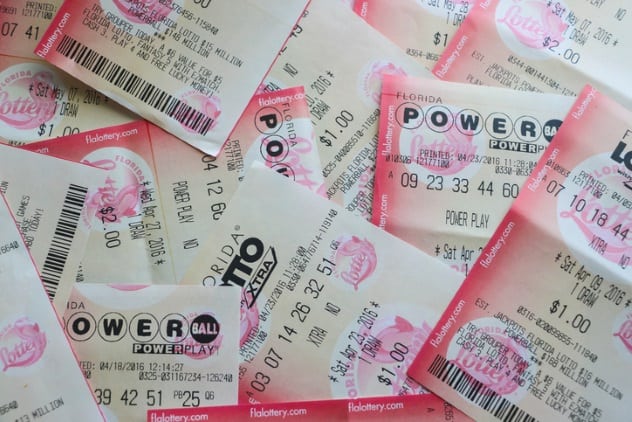
For the better part of the 20th century, state lotteries were illegal. These days, 42 states partake in the optimistic gamble, which was reinstated beginning in New Hampshire in 1964. Interestingly enough, a 2010 study found that lottery tickets suck away nine percent of take-home incomes from households earning less than $13,000 a year. Much of this, according to the study, is due to the hopes and dreams of impecunious citizens desperate to improve their standard of living. Thus, it is the poorest communities that are hit the hardest when buying into the fantasy of a financial windfall. “Simply put, lotteries take the most from those who can least afford it,” wrote economist Richard Wolff. In addition, academic studies have shown that communities of color spend far more on lotteries, with African Americans averaging $998 a year, versus only $210 for Caucasians.
Though the dream may seem far-fetched, those who have won the lottery are not guaranteed a life of bliss. While some winners have blown through their riches overnight, others have used it to fuel unrelenting gambling binges. In addition, the sudden infusion of money has even invited violent crime through the jealousy of others determined to get their share of the money. Nonetheless, it’s safe to assume that the futile gamble for instantaneous riches is one we are all willing to take.[2]
8 Casino Tension
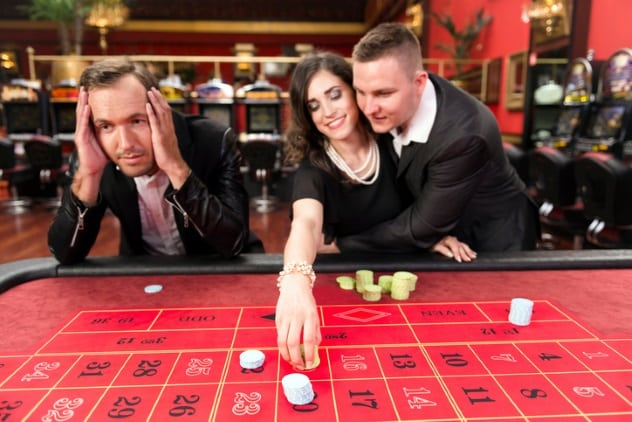
It’s evident that tensions run high in casinos, where payouts are seldom seen and livelihoods are often destroyed. Some people cry, some drink, and others jump out of a window. There are times, of course, when temperamental washouts have projected their wrath at the dealer. Take, for example, Kien Nguyen, 34, who had the bright idea to plunge a blade into the chest of roulette croupier David Downes at London’s Empire Casino, leaving him with a punctured liver, in July 2018.
In June 2018, at the Hollywood Casino in Baton Rouge, Louisiana, Clifton Jeanpierre III, 27, jumped over a table to attack his dealer before being subdued by security. His cheerful antics only escalated while en route to the police station. After kicking out the squad car’s window, Jeanpierre told the officer that he would find out where he lived by Googling his address and then murder his entire family. Predictably, the silver-tongued gambler had a previous run-in with the law when he threatened to burn his father’s house down. Apart from being a failure at gambling, it is clear that he can’t even follow through with his threats.
A considerably bigger casino calamity occurred at Chips Casino & Lounge in Bismarck, North Dakota, in May 2012, when a fight broke out involving 15 people. It all began when an intoxicated patron refused to put out his cigarette. Beer bottles were thrown, four tables were destroyed, noses were broken, knees were dislocated, and $1,000 of damage was incurred. Ironically, not a single person was arrested that night.[3]
7 Checkout Time

Connecticut’s Foxwoods Resort Casino and Mohegan Sun are two destinations to avoid for anyone with dire preexisting superstitious beliefs. Take the case of 38-year-old Robert Tom, who collapsed dead of a heart attack moments after winning $4,000 at Foxwoods. Since his untimely death on May 12, 1993, nearly 150 people have never left the premises alive while visiting Foxwoods or Mohegan Sun. The majority of deaths were due to heart attacks, while over two dozen were attributed to either drug overdoses or suicide. In April 2004, a man who had packed his suitcase with bricks smashed out a window in his Mohegan Sun bedroom and jumped 20 stories to the unforgiving concrete below.[4]
Nevertheless, one of the greatest factors causing incessant illnesses for casino workers and visitors is the danger of secondhand smoke. According to the American Lung Association, chronic obstructive pulmonary disease (COPD) kills at a higher rate in Nevada than any other state in America. This is due to the fact that state’s legislators have protected its casinos from smoking bans in order to preserve Nevada’s gaming revenue. Interestingly enough, casino employees who have fallen ill from smoke rarely complain out of fear of losing their livelihood. For now, a smokeless casino in Vegas is a far-fetched dream where the only end result is more body bags.
6 The Vigilance Committee Of San Francisco

The American West frontier in the 1850s was known for its triple-W vices: whiskey drinking, whoring, and wagering. Many of the first structures built were recreational facilities that seemingly appeared overnight, attracting hordes of men whose sole profession was gambling. Following California’s Gold Rush in 1849, an innumerable amount of gamblers settled in San Francisco, and the center of the city, Portsmouth Square, became what Las Vegas is today. The craze that swept the City by the Bay, however, also attracted a wave of violent crime, transforming a once-peaceful community into a lair of terror. Shootings and stabbings became everyday occurrences, escalating to such proportions that residents began reorganizing the defunct Vigilance Committee.
By 1851, vigilantes had either banished or executed many of the city’s vile miscreants, yet much more needed to be done. One particular cleansing at the hands of the no-nonsense committee occurred on May 22, 1856. A man by the name of Cora was found guilty of fatally shooting another man in the street. Following his trial, he was brought to the roof of the headquarters building and hanged in broad daylight for the public to witness, particularly the city’s remaining vermin who were contemplating their next crimes.[5]
5 Cheater’s Punishment
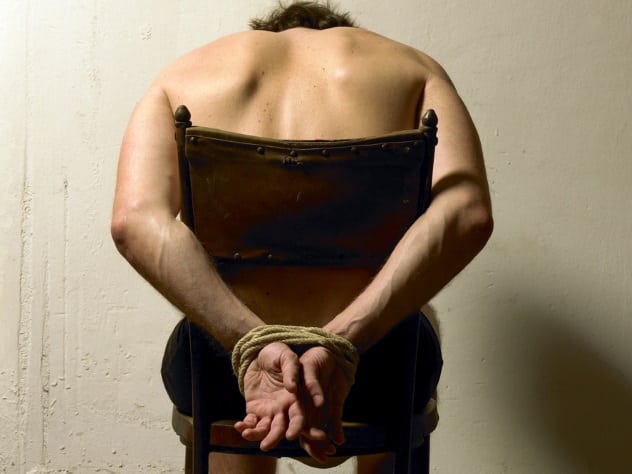
Reminiscent of a scene from Martin Scorsese’s classic film Casino, cheating in Las Vegas has often been met with unflattering outcomes. Though these days, the punishment may seem harsh (prosecution and jail time), it is merely a walk in the park in comparison to the days when the mob owned Vegas. In layman’s terms, stealing from Mafia-owned casinos would be no different than stealing from Al Capone.
From the 1950s to the 1970s, a cheater would be fortunate to simply leave the premises with mangled fingers or a broken kneecap; however, that was rarely the case. Security held little to no reserve when it came to beating fraudsters unconscious right out on the casino floor in front of bemused and horrified gamblers. One blackjack player ended up with a ruptured kidney at the now-defunct Binion’s Horseshoe, while another man was kept in the basement for three days after attempting to steal chips. On that lovely three-day honeymoon, he was reportedly refused water and beaten mercilessly every day before being thrown out into the street.
Although times have changed, every now and then, someone steals from the wrong joint. In January 2015, Robert Forlina filed a lawsuit against Valley Forge Casino near Philadelphia after he was roughed up for counting cards. According to Forlina, he was dragged into a back room, thrown against a concrete wall, stripped of his “winnings,” and chained at the ankles. He sought in excess of $150,000 for false arrest, false imprisonment, illegal search, assault, and battery.
On the bright side, Forlina was fortunate enough to forgo a forceful and oh-so-romantic cavity search. Such was the case for a Philadelphia police officer who was caught using a card-counting device during a game of blackjack at Parx Casino. During that charming incident, the trickster cop was forced to strip nude and bend over. Fortunately, the painful situation eventually turned in his favor when a jury awarded him $125,000.[6]
4 When Nature Calls

When Floyd Kibiloski, 60, sat down at a slot machine at the Caesars Indiana casino in August 2007, the last thing he expected was to sit in a puddle of urine. The yellow piss that filled his chair and drenched his pants was donated by a woman who had just exited the seat. Not to be deterred, given his own lust for gambling, a soaked Kibiloski walked to his car to change into an old pair of sweatpants before returning to the casino.
As nauseating as it may sound, it’s quite common for addicted gamblers to soil themselves after long hours of play. According to Carol O’Hare, executive director of the Nevada Council on Problem Gambling, “Gamblers who become addicted can enter a trancelike state where even basic hygiene habits are ignored.” They can go hours or even days without eating or bathing. O’Hare also explained that many gamblers resort to wearing adult diapers or relieve themselves at the tables or slot machines to keep from losing their seat.
Kimberly-Clark, the makers of Depend brand disposable undergarments, has cashed in on such revolting yet committed gambling enthusiasts. Their product, “Player’s Advantage,” is marketed to gamblers who prefer to soil themselves rather than interrupt their state of play. Thus, the manufacturers ensure that players will have “an additional 10–12 hours of continuous play” before needing to change into a fresh diaper. Casino executives couldn’t be happier with the undergarments, with one exec stating, “We’re delighted this product will allow our customers to play the games they love without taking pesky bathroom breaks. When ‘nature calls,’ our customers will now have the freedom to put the call on hold, so to speak.”[7]
3 Anthony Cornero
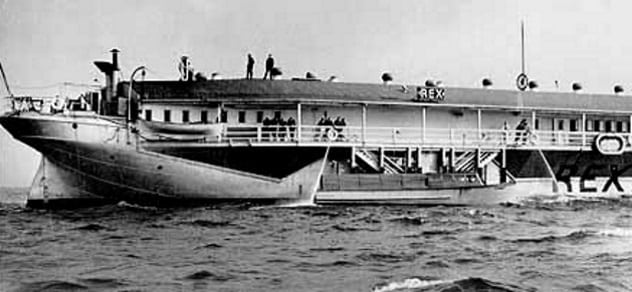
Organized crime figure Anthony Cornero was always one step ahead of the law when it came to duplicitous schemes. Sailing 5 kilometers (3 mi) off Santa Monica’s coast, Cornero took advantage of the international waters by operating a gambling ship, the SS Rex. It was 1938, and the first cruise ship in which over 2,000 Southern Californians could enjoy exquisite restaurants, shows, and, of course, gambling was in business.
Operating 24 hours a day, the Rex proved to be both an immediate success as well as a perpetual nuisance to California officials, sparking outrage among lawmakers, including the state’s district attorney. A series of raids against the floating casino were ordered despite it being anchored outside the “three-mile limit.” After a brief standoff, Cornero was arrested, only to return to the Rex a short time later following a successful court appeal.
The Rex continued to be deemed an inevitable floating gateway to narcotics and prostitution. Such unremitting concerns by vexatious politicians led to a second raid which lasted eight days, ending with Cornero’s surrender because he needed a haircut. As obstreperous as those they loathed, law enforcement despoiled the ship, tossing all gambling equipment into the temperate waters below. With his back against the wall following President Truman outlawing gambling ships in 1948, Cornero returned to Las Vegas, where he opened the Stardust Hotel. In spite of his failed venture, the Rex would become the epitome of floating casinos in the years to come.[8]
2 The Civil War
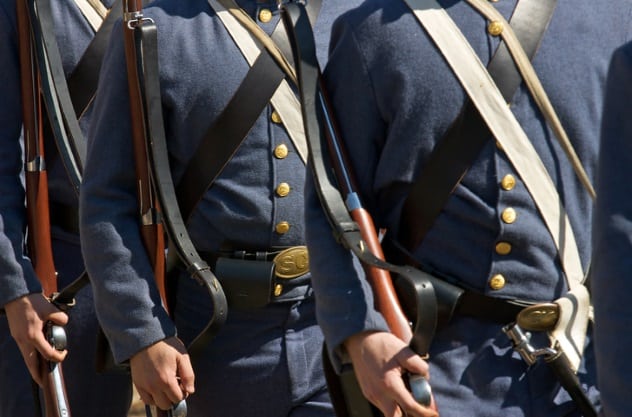
During the quiet, noncombatant hours of the US Civil War, the looming trepidation of demise was obscured by periods of boredom. In order to pass time, soldiers on both sides of the conflict amused themselves by either reading or gambling. Anything from cards, horse races, chess, checkers, or dominoes were turned into wagers among those willing to risk the few bills they had to their name. Poker, blackjack, keno, and euchre were such a favorite pastime that decks of cards became hard to come by, prompting Confederate soldiers to scour the battlefields. If cards were not obtained from fallen soldiers or by trade with their Union counterparts, they were forcefully acquired from Union prisoners.
In spite of gambling being discouraged by authorities, it became so prevalent that by 1864, a Union division called the Army of the James became known among soldiers as “the Army of the Games.” Countless soldiers even resorted to racing lice by placing their critters in a tin plate for spectators to wager a bet on the fastest “runner.” In such instances, the first bug to cross over the edge of the plate was declared the winner. As ludicrous as it may sound, soldiers from both the North and South would sometimes meet late at night in the “in-between zone” to gamble on cards or dice, temporarily forgetting their troubles during the few fleeting hours of equanimity.[9]
1 The Moulin Rouge Hotel, An American First
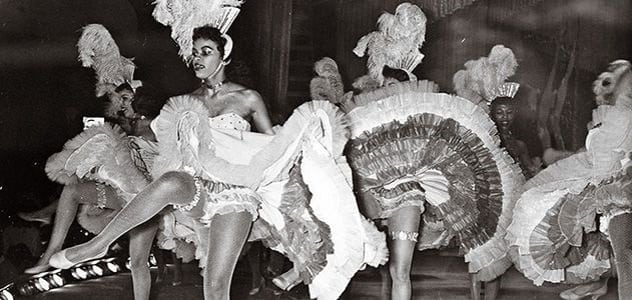
In 1950s America, when Jim Crow laws were enforced, black residents in Las Vegas could work on the Strip as cooks, maids, or janitors but nothing more. That all changed on May 24, 1955, when the Moulin Rouge Hotel opened on the west side of town. For the first time, African Americans were employed as waiters, waitresses, and blackjack dealers.
“America’s First Interracial Hotel” became an instant hit among Hollywood elites such as Cary Grant, Humphrey Bogart, and Frank Sinatra, who were captivated with the hotel’s sensational attractions. At a time when dozens of states had anti-miscegenation laws, the Moulin Rouge was ground zero in Nevada for interracial mixing. With Sinatra taking to the stage alongside Nat King Cole, Dinah Washington, Billie Holliday, and Judy Garland, the hotel’s lifespan appeared promising.
Predictably, casino owners on the Strip were infuriated due to their declining popularity and, thus, loss of revenue. By October, dancers, waiters, blackjack dealers, and cigarette girls were shocked to find padlocks on the doors to the Moulin Rouge. The unforeseen closing not only meant unemployment for the entire staff but cast a shadow on their future endeavors. All who relished being “front-of-house workers” (dancers, dealers, etc) were turned away on the Strip. Those who did not leave town found little work as maids or dishwashers.
Today, a vacant lot is all that remains. Stan Armstrong, a documentarian who grew up near the site of the Moulin Rouge, has compared the hotel to Camelot for the African American community: “In its one shining moment, the Moulin Rouge brought pride to black Las Vegas. Pride and hope. In that moment, the Rouge changed the world. And then the world moved on.”[10]
Adam is just a hubcap trying to hold on in the fast lane.
Read more memorable tales of gambling on 10 Crazy Huge Gambling Wins and 10 Bizarre or Memorable Casino Experiences.








